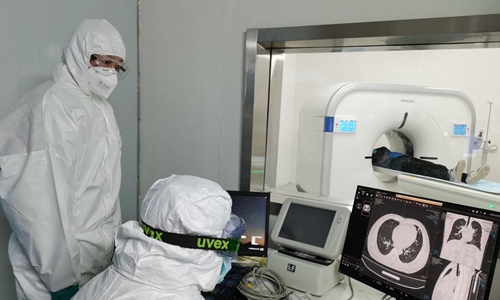HOME >> OPINION
US squanders opportunity to draw closer to China
By Xu Liang Source:Global Times Published: 2020/2/22 11:36:36

Doctors check the CT image of a patient's lungs at Leishenshan (Thunder God Mountain) Hospital in Wuhan, capital of central China's Hubei Province on February 9, 2020. Photo: Xinhua
Amid the ongoing coronavirus outbreak, the US could have boosted relations with China, but instead, it has politicized the epidemic and launched new attacks against China.
First, the US could have used the opportunity to enhance cooperation and improve bilateral ties by helping China in the fight against the epidemic, but the acts of some US politicians and media outlets have disappointed many Chinese people.
As the two countries just reached a phase one trade deal, some Chinese people thought the US would develop ties with China and reciprocate the latter’s concessions on trade issues. However, what followed instead was not kindness, but attacks against China’s system and its high-tech giant Huawei.
Although the US is a major innovation powerhouse in terms of technology, in political and diplomatic domains, it lacks creative thinking. The country was not even confident enough to explore a mode allowing two powers to peacefully coexist before pushing the China-US ties toward the Thucydides trap.
Second, the US could have supported China’s further reforms with a humanitarian spirit, but it has adopted a tough stance.
Many Chinese have long regarded the US as a teacher. Within the Chinese academic community, there are numerous essays researching US emergency management mechanisms, but few raise critical questions. On the contrary, many Chinese scholars view US mechanisms as models from which China can learn.
That the US has politicized the epidemic has hurt the feelings of these Chinese scholars who are willing to learn with an open mind from the US.
Third, the US has missed an opportunity to engage in epidemic control which may offer it experience in dealing with similar crises in the future.
China has taken effective prevention and control measures that have impressed the world. Meanwhile, as a responsible world power, China has been regularly updating the international community with epidemic information in a timely manner, cooperating well with other countries, and working hard to prevent the virus from spreading globally.
It is true that China’s efforts to prevent and control the epidemic are not flawless, but its steps have been widely applauded by the international community, including the World Health Organization.
The US could have positively joined hands with China and drawn on China’s system management know-how to establish a dialogue that would allow the two countries with different political systems to coexist peacefully and to set an example for the world. But facts have proven that the US has lost such confidence and ability.
Fourth, the US’ double standards have undermined the reliability of its foreign policy. People in both the US and China uphold fairness.
The 2009 H1N1 flu spread across the US and then the world, killing at least 18,449 people in that year alone, but no country in the world blamed the US political system.
However, amid the ongoing coronavirus outbreak, some US politicians and media outlets have taken the opportunity to politicize the epidemic and attack China’s political system. Such double standards are a bitter irony to the spirit of fairness that the US has been advocating.
Since the outbreak of the epidemic, governments and people of various countries have voiced their support for China in various ways. Many ordinary Americans, as well as Chinese nationals overseas, have made every effort to donate supplies, while direct flights between China and the US have been hindered to a certain extent. Their efforts have deeply touched Chinese people and will be forever remembered.
Strengthening epidemic prevention and promoting international cooperation is in line with international justice. But seizing upon the epidemic to stir up trouble not only goes against America’s values and its long-term national interests, but also stains its own international image.
The author is an associate professor at the School of International Relations, Beijing International Studies University, and a visiting scholar at the University of Iowa. opinion@globaltime.com.cn
Posted in: VIEWPOINT